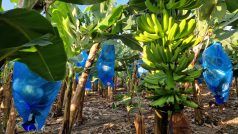Cocoa prices are skyrocketing, and soon we’ll be paying more for coffee and bananas as well. This is due to poorer harvests due to climate change. Farmers complain about drought, but also, conversely, about torrential rains and plant diseases. Agricultural expert and analyst of the Association for International Affairs Barbora Chmelová claims that the problem with coffee production concerns all growers – from South and West America to Ethiopia and Latin America.
Prague
11:16 a.m April 25, 2024
Share on Facebook
Share on LinkedIn
Print
Copy the url address
Abbreviated address
Copy to clipboard
Close
Farmers should grow rice without water, the analyst urges (illustrative photo) | Photo: Photobank Profimedia
Already, farmers are losing about twenty percent of their original agricultural production. As a result of the changes, they have less and less crops, on the contrary, the costs of irrigation, fertilizers and others continue to rise.
Listen to the entire Spotlight on Patrik Salat
This is also pointed out by a study published in the scientific journal Nature. It is supported by researchers from the Institute for Climate Research in Potsdam, Germany. According to local scientists, food prices could increase by up to three percent per year.
However, the case of the jump in the price of cocoa on the commodity markets shows that the price of some commodities can easily rise fivefold.
In the case of cocoa, the big traders are trying by all means to get supplies, which are scarce. The big ones from the chocolate factories even buy next year’s production.

According to Chmelová, crops such as cocoa, coffee or bananas are among the more luxurious ones, their lack will probably not have major social impacts. It would be worse if the availability of agricultural crops such as rice or wheat were significantly reduced.
According to Chmelová, their lack could trigger revolutions or conflicts in poorer parts of the world and threaten regional geopolitical stability. She lived alone for several years in the Philippines after the typhoon.
“Climate change there affects not only the agricultural production in the fields, but also the local communities, which are also dependent on fishing or the collection of molluscs and crustaceans from the coast,” Chmelová recalls in 2013, when she helped the Philippines after a huge typhoon.
El Niño and climate change
“Scientists today are investigating the relationship between the El Niño phenomenon and climate change. It is reported that El Niño was previously associated with solar activity and the amount of heat that accumulated during marine days. Now they are also thinking about the fact that this phenomenon is increasingly connected to the manifestations of anthropogenic climate change and human-caused global warming.”

Farmers around the world are struggling with extreme weather. Bananas, coffee or cocoa may therefore be less available
Read the article
“The prevailing opinion is that El Niño is closely related to climate change, moreover, it worsens its manifestations even further. At the time I worked in the Philippines, El Niño meant that there was no rain for several months, but the farmers there are very focused on rice production. And as we all know, rice is grown in fields flooded with water – it is also there as a prevention against all kinds of pests.”
“Suddenly the farmers were confronted with the reality that they lacked water, the fields were dry, and they were unable to plant, and if they did, they didn’t even grow.”
Chmelová belonged to a group of scientists who tried to show the locals that there was an innovative way of farming that was invented by a priest in Madagascar. “It’s a method of growing rice without water, but since the water method is literally rooted there, we only managed to convince a few farmers,” he adds.
Even Europe
Climate changes can also be seen in Europe – whether it is the production of grain or hops.
In our case, it is certainly a change in the production of fruit, for example apricots or grapevines.

“Plants or trees will bloom, but sooner. At the same time, almost no pollinators fly yet, at most bumblebees. That way, there is less pollination and then the frosts will come, which will burn the already planted fruits,” adds the expert.
What is the future of agriculture not only in developing countries? And what can modern technologies help farmers with? Listen to Focus in the audio recording at the beginning of the article.
Patrick Salat
Share on Facebook
Share on LinkedIn
Print
Copy the url address
Abbreviated address
Copy to clipboard
Close









